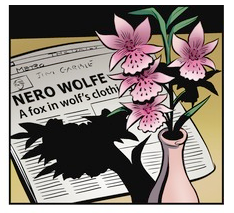CSotD: Dancing on Dilbert’s Grave
Skip to commentsYesterday’s F Minus (AMS) is clearly coincidental, given that it was not only written and drawn but printed and sitting in newspaper mailrooms well before Scott Adams immolated himself last week.
But it’s a good summary of the story nonetheless, given the number of people rushing to proclaim that they never liked the sumbitch or his stupid comic strip, now that he’s been dropped by nearly all the newspapers that carried him, as well as his syndicate, which should be the coup de grace for Dilbert.
Technically, BTW, he could self-syndicate the strip, and given the response of some rightwing sources, he’d likely find a few willing clients, either because they agreed with his vision, or because they wanted to own the libs or both.
But my guess is that he’s ready to move on.
Reaction to Adams’ fall from grace and the death of Dilbert carries a whiff of Aesop’s fable of the dying lion, in which first the bold, then the lesser animals crowd around the once mighty beast to take swipes at him as he fades away.
Not, mind you, that Adams possessed a lot of personal majesty, but, then, there are plenty of artists whose behavior does not bear close examination: Byron was described as “mad, bad and dangerous to know” by one of several abused ex-lovers, and, on a more immediately relevant level, cartoonist Al Capp was an appalling individual who did well to die before the “Me Too” era.
Still, in the fable, the lion doesn’t mind being assaulted by the ox and the boar, but feels insulted when the ass gives his dying body a kick, and, similarly, while Adams deserves all the bad-mouthing he gets for his outrageous personal beliefs, some of the people lining up to declare that they never liked Dilbert are holding up more of a mirror than a spyglass.

As it happens, Dilbert debuted in 1989, shortly before I got into middle management, and maybe it was so specialized that you had to have been there. Still, its popularity shows that it was far more than a niche product.
By 2007, I had risen beyond middle management, and when the above strip appeared, I was not only editor of a small newspaper but interim publisher, putting me very much in the shoes of the Pointy Haired Boss, though I hope I handled things a little better.
Still, we were such a tiny staff that anyone going on vacation — however well-earned — nearly ground the place to a halt, and I had this strip up on my bulletin board.

But that was after years of having PHB idiocy rain down on my poor head. I could tell genuine stories that would demonstrate beyond debate the truth of both Adams’ original vision and the Peter Principle, which Wikipedia explains:
People — mostly Millennials, I think — say the movie Office Space did it better, but Office Space was focused on low-level employees, not middle management.
It also had the advantage of being a one-and-done. Like many comic strips and TV shows, Dilbert outlived its freshness of concept and drifted off into staleness and irrelevancy.
Which, in the current world of comic strips, wouldn’t have doomed it. Staleness becomes familiarity and there is a sizeable market for strips that tell the same jokes for years on end, passed along to new artists who simply fill the template readers have come to expect.
What doomed Dilbert was that Adams, like Al Capp before him, let his increasingly antisocial personal views appear in the strip. The focus on management foibles had long since gone stale and the new material was off-topic and not just conservative — a lot of strips are conservative — but openly offensive.
Lord Byron managed to compartmentalize his art and his personal life, the message being that you should read his poetry but for god’s sake don’t date him.
Adams did not, and not only did his politics infiltrate his work, but he posted more extreme views on a blog that gained its audience through his identification as the creator of Dilbert, further linking his outrageous racism and misogyny with the strip.
Note that I still object to bowdlerizing Roald Dahl: Either publish what he wrote or stop publishing what he wrote.
Ditto with Scott Adams, but, even if you disagree, you can’t simply swap words in a three or four panel comic strip. You’re either on the bus or off the bus.
Deb Milbrath lays it out in plain terms: His latest declaration of overt racism made it impossible for either the newspapers or his syndicate to pretend not to notice.
Was he angling to retire? Is it a sign of some deeper distress?
He’s got enough money to live out his life on an island, if he’d like, or, with the help of his new BFF, Elon Musk, he could parlay this into becoming a hero of the growing racist fringe.
Perhaps. But cutting Adams and Dilbert loose was the only responsible decision, despite the predictable objections of those who hate cancel-culture but endorsed the cancellation of the Dixie Chix and Colin Kaepernick, and who are currently attempting to cancel GenZ voters.
I was sorry to see most of the cancellations come from Corporate Headquarters, rather than from individual newspapers.
It’s confirmation that most local papers have ceased to be local. When USA Today first appeared, we jokingly dubbed it the “McPaper,” but that has stopped being funny.
However, I was very pleased to see that the Washington Post’s initial coverage of the debacle has, as I write this, drawn over 16,000 comments.
The Pointy Headed Bosses at Corporate may not realize it, but people care about comics.
Cartoonists will just have to deal with the growing fact that people no longer care about newspapers.

It seems that today’s Mt. Pleasant (Tribune) is testament to the difficulty of getting a new strip off the ground. I haven’t seen an announcement, but tomorrow is the last day of the month and, three weeks ago, DD Degg suggested potential bad news for the two-year-old strip.
Between newspaper chains dictating cutbacks in comics, editors ignoring a page they assign to the backshop, and the continued domination of zombie strips whose creators have long since retired or died, it’s hard for a new strip to survive.
The vast majority of cartoonists live on royalties, and while that’s a sweet ride for the major strips, it doesn’t pay the rent for the minor ones.
Did I mention the importance of subscribing to GoComics and ComicsKingdom yesterday, and of supporting a Patreon or two?
Well, I just did again.
Though, as Arlo and Janis (AMS) point out, nothing lasts forever.
Certainly not if you leave it up to the PHBs at Corporate.







Comments 22
Comments are closed.